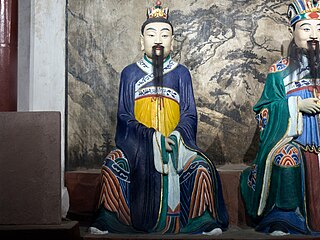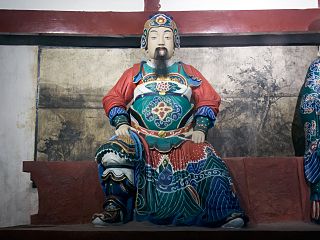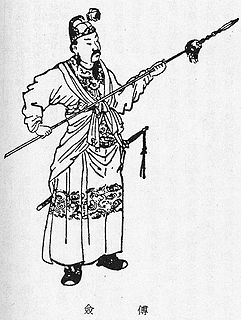Fu Rong 傅肜 | |
|---|---|
 | |
| Born | Unknown |
| Died | 222 |
| Occupation | Military officer |
| Children | Fu Qian |
Fu Rong (died 222 A.D.) was a military officer of the state of Shu Han during the Three Kingdoms period of China.
Fu Rong 傅肜 | |
|---|---|
 | |
| Born | Unknown |
| Died | 222 |
| Occupation | Military officer |
| Children | Fu Qian |
Fu Rong (died 222 A.D.) was a military officer of the state of Shu Han during the Three Kingdoms period of China.
Fu Rong was from Yiyang Commandery, which is in present-day Xinyang, Henan. In 221, he followed Liu Bei in the campaign against Sun Quan's forces, leading to the Battle of Xiaoting. In 222, Sun Quan's general Lu Xun defeated Liu Bei's forces at Xiaoting and Yiling and forced them to retreat. Fu Rong volunteered to cover the rear during the Shu retreat. He continued to hold his ground firmly and vent his fury on the enemy even though all his comrades had already been killed. When the Wu soldiers offered him a chance to surrender, he replied, "Dogs of Wu! Do you think a Han officer will ever surrender?" He was eventually killed in action. [1] Emperor Wu, the founding emperor of the Jin dynasty, specifically mentioned this incident in his decree. [2]
Fu Rong's son, Fu Qian, continued serving Shu as a military general until his death during the conquest of Shu by Wei in 263.
In the 14th-century historical novel Romance of the Three Kingdoms , Fu Rong is renamed Fu Tong (Chinese :傅彤). After Liu Bei's defeat at the Battle of Xiaoting, Fu Rong volunteers to cover the rear from pursuing enemy troops. He is eventually surrounded by the enemy. The Wu general Ding Feng shouts at him: "Many Shu soldiers have died while others have surrendered. Your lord Liu Bei has been captured. Now that you are exhausted and isolated, why don't you surrender early?" Fu Rong replies sternly: "I am an officer of (Shu) Han, how can I surrender to the dogs of Wu?", after which he grabs his spear, mounts his horse, and leads his men to make a last stand. However, after fighting for more than 100 rounds, Fu Rong is unable to break out of the encirclement. After sighing "I have come to my end!", he vomits blood and dies. [3]

The Battle of Xiaoting(猇亭之戰), also known as the Battle of Yiling and the Battle of Yiling and Xiaoting, was fought between the state of Shu and the nominal vassal kingdom of Cao Wei, Wu, between the years 221 and 222 in the early Three Kingdoms period of China. The battle is significant because Wu was able to turn the situation from a series of initial losses into a defensive stalemate, before proceeding to win a decisive victory over Shu. The Wu victory halted the Shu invasion and preceded the death of Liu Bei, Shu's founding emperor.

Zhao Yun, courtesy name Zilong (子龍), was a military general who lived during the late Eastern Han dynasty and early Three Kingdoms period of China. Originally a subordinate of the northern warlord Gongsun Zan, Zhao Yun later came to serve another warlord, Liu Bei, and had since accompanied him on most of his military exploits, from the Battle of Changban (208) to the Hanzhong Campaign (217–219). He continued serving in the state of Shu Han – founded by Liu Bei in 221 – in the Three Kingdoms period and participated in the first of the Northern Expeditions until his death in 229. While many facts about Zhao Yun's life remain unclear due to limited information in historical sources, some aspects and activities in his life have been dramatised or exaggerated in folklore and fiction. In the 14th-century historical novel Romance of the Three Kingdoms, he was lauded as a member of the Five Tiger Generals under Liu Bei.

Gan Ning, courtesy name Xingba, was a Chinese military general serving under the warlord Sun Quan in the late Eastern Han dynasty. Originally a notorious pirate, he gave up the life of a marauder in the late 190s and became a subordinate of Huang Zu, the Administrator of a commandery in present-day east-central Hubei. Disheartened by Huang Zu's indifferent attitude towards him, Gan Ning eventually left Huang and made his way into Wu territory, where he found his calling and became a military officer under the warlord Sun Quan. Throughout his years of service under Sun Quan until his death, Gan Ning fought in numerous battles for his lord, including the battles of Jiangxia (208), Red Cliffs (208–209), Xiaoyao Ford (214–215) and Ruxu (217).

Zhang Fei, courtesy name Yide, was a Chinese military general and politician serving under the warlord Liu Bei in the late Eastern Han dynasty and early Three Kingdoms period of China. Zhang Fei and Guan Yu, who were among the earliest to join Liu Bei, shared a brotherly relationship with their lord and accompanied him on most of his early exploits. Zhang Fei fought in various battles on Liu Bei's side, including the Red Cliffs campaign (208–209), takeover of Yi Province (212–214), and Hanzhong Campaign (217–218). He was assassinated by his subordinates in 221 after serving for only a few months in the state of Shu Han, which was founded by Liu Bei earlier that year.
Lu Xun, courtesy name Boyan, also sometimes referred to as Lu Yi, was a Chinese military general and politician of the state of Eastern Wu during the Three Kingdoms period of China. He started his career as an official under the warlord Sun Quan in the 200s during the late Eastern Han dynasty and steadily rising through the ranks. In 219, he assisted Sun Quan's general Lü Meng in an invasion of Jing Province, which led to the defeat and death of Liu Bei's general Guan Yu. In 222, he served as the field commander of the Wu army in the Battle of Xiaoting against Liu Bei's forces and scored a decisive victory over the enemy. Lu Xun reached the pinnacle of his career after this battle as Sun Quan regarded him more highly, promoted him to higher positions and bestowed upon him unprecedented honours. Throughout the middle and the later parts of his career, Lu Xun oversaw and managed both civil and military affairs in Wu while participating in some battles against Wu's rival state, Wei, from time to time. In his final years, Lu Xun was drawn into a succession struggle between Sun Quan's sons and fell out of Sun Quan's favour as a consequence. He managed to retain his appointment as Imperial Chancellor – an office he assumed in 244 – but died a year later in frustration. Lu Xun's role in the Wu government was likened to that of a custos morum as he believed firmly in and upheld Confucian principles and practices. On the one hand, he provided constant and timely advice to Sun Quan to exercise benevolence and consider the welfare of the people. On the other hand, he vehemently objected to Sun Quan's idea of replacing his legitimate heir apparent in favour of a younger son.

Shamoke was a tribal chieftain who lived in Wuling Commandery in the late Eastern Han dynasty and Three Kingdoms period of China. He allied with the Shu Han state during the Battle of Xiaoting of 221–222 against the Eastern Wu state and was killed in battle.

Liao Hua, courtesy name Yuanjian, originally named Liao Chun, was a military general of the state of Shu Han during the Three Kingdoms period of China. Like Zhang Yi and Zong Yu, Liao was one of few officials who served the Shu-Han state throughout its entire existence.

Pang De, courtesy name Lingming, was a military general who lived during the late Eastern Han dynasty of China. He started his career under the warlord Ma Teng, who was based in Liang Province. In 211, Ma Teng's son Ma Chao, along with a coalition of warlords from Liang Province, started a rebellion against the Han central government, which was controlled by the warlord Cao Cao. After Cao Cao defeated Ma Chao and the coalition at the Battle of Tong Pass, Ma Chao fled to Hanzhong Commandery and took shelter under the warlord Zhang Lu. Pang De accompanied him to Hanzhong. When Ma Chao defected from Zhang Lu's side in order to join the warlord Liu Bei, Pang De remained in Hanzhong and eventually came to serve Cao Cao after Cao Cao defeated Zhang Lu at the Battle of Yangping and took over Hanzhong. In 219, Pang De fought at the Battle of Fancheng under Cao Ren's command against Liu Bei's forces led by Guan Yu. Pang De was captured in battle and eventually executed by Guan Yu when he refused to surrender.

Ma Liang (187–222), courtesy name Jichang, was an official serving under the warlord Liu Bei during the late Eastern Han dynasty of China. Since he was young, Ma Liang was famous for his exceptional talent, with Chen Shou describing him as one of Shu's best officials; however, he was killed in battle at the age of 35 years during the Battle of Xiaoting. He was the elder brother of Ma Su and served in the state of Shu Han as one of the founding emperor Liu Bei's Palace Attendants during the early Three Kingdoms period.

Yan Yan was a Chinese military general and politician who served under Liu Zhang, the Governor of Yi Province, during the late Eastern Han dynasty of China. Although there is very little information about Yan Yan in historical records, he is given a much prominent role in the 14th-century historical novel Romance of the Three Kingdoms as a general who initially serves under Liu Zhang before switching allegiance to Liu Bei later.
Liu Feng was an adopted son of Liu Bei, a warlord who lived in the late Eastern Han dynasty and founded the state of Shu Han in the Three Kingdoms period of China. He traced his lineage to a certain marquis whose family name was "Kou" (寇). He was also related to the House of Liu – the imperial clan of the Han dynasty from which Liu Bei descended – albeit not directly. He served as a general in his adoptive father's military forces.
Huang Quan, courtesy name Gongheng, was a military general of the state of Wei during the Three Kingdoms period of China. He previously served under the warlords Liu Zhang and Liu Bei during the late Eastern Han dynasty and in the state of Shu during the early Three Kingdoms period before defecting to Wei. Liu Bei relied heavily on Huang Quan for counsel in both domestic and foreign policy. Under the Wei government, however, Huang Quan was restricted to only internal affairs because even though the Wei emperor Cao Pi appreciated him for his talent, he doubted Huang Quan's allegiance and believed he was still secretly loyal to Liu Bei.
Chen Shi was a military officer of the state of Shu Han in the Three Kingdoms period of China. He previously served under the warlord Liu Bei in the late Eastern Han dynasty. His name is sometimes recorded as Chen Jie.

Deng Zhi, courtesy name Bomiao, was a government official, diplomat and military general of the state of Shu Han during the Three Kingdoms period of China. A descendant of Deng Yu, Deng Zhi started his career in the late Eastern Han dynasty under the warlord Liu Bei as a low-level officer in Pi County. After Liu Bei discovered his talent, Deng Zhi steadily rose through the ranks to become a county prefect and later a commandery administrator and imperial secretary. In 223, the Shu regent Zhuge Liang sent him as Shu's envoy to meet Sun Quan, the ruler of Shu's ally state Wu, and reestablish the Wu–Shu alliance against their common rival state Wei. Deng Zhi succeeded in his mission and earned praise from Sun Quan for strengthening Wu–Shu ties. In 227, Deng Zhi became a military general and he participated in the first Shu invasion of Wei by leading a decoy force with Zhao Yun to distract the Wei general Cao Zhen. Although they lost the battle, Deng Zhi and Zhao Yun managed to rally their troops to put up a firm defence during their retreat and minimise their losses. Following Zhuge Liang's death in 234, Deng Zhi rose to higher general ranks and was stationed in present-day Chongqing for about 10 years before he was recalled back to the Shu capital Chengdu in his 70s to serve as General of Chariots and Cavalry. In 248, he suppressed a rebellion in Fuling. He died in 251.
Wu Ban, courtesy name Yuanxiong, was a Chinese military general of the state of Shu Han in the Three Kingdoms period of China.
Sun Huan, birth name Yu Huan, courtesy name Shuwu, was a military general of the state of Eastern Wu during the Three Kingdoms period. He was a distant relative of Sun Quan, the founding emperor of Wu.

Fu Qian was a military general of the state of Shu Han in the Three Kingdoms period of China. He was the son of Fu Rong.
Bu Zhi, courtesy name Zishan, was an official and military general of the state of Eastern Wu during the Three Kingdoms period of China. Originally a scholar of humble background, he became a subordinate of the warlord Sun Quan in the late Eastern Han dynasty and gradually rose through the ranks. Between 210 and 220, he served as the governor of the remote and restive Jiao Province in southern China. During the Battle of Xiaoting/Yiling of 221–222, he quelled local uprisings in Sun Quan's territories in southern Jing Province and maintained peace in the area. After Sun Quan became emperor in 229, Bu Zhi oversaw the Wu armed forces guarding the Wu–Shu border at Xiling for about 20 years. During this time, he also gave advice to Sun Quan's first heir apparent, Sun Deng, and spoke up for officials affected by Lü Yi's abuses of power. In 246, he became the fourth Imperial Chancellor of Wu, but died in office in the following year.
Liu Zan (183–255), courtesy name Zhengming, was a military general of the state of Eastern Wu during the Three Kingdoms period of China. He previously served under the warlord Sun Quan in the late Eastern Han dynasty.